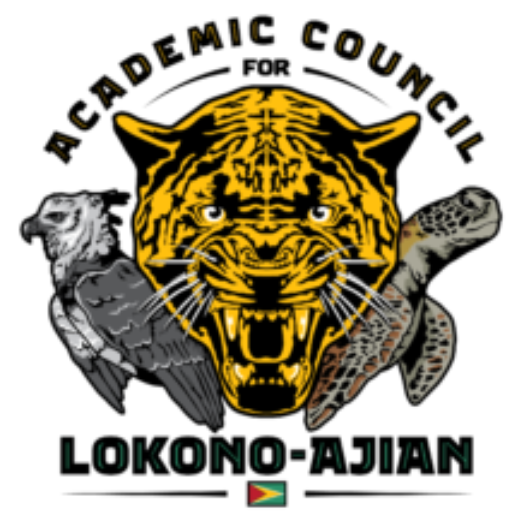Academic Counsel for Lokono-Ajian
Lokono Online Reference Library
Lokono Online Reference Library
The Lokono Online Reference Library serves as a vital resource for those interested in exploring the history, language, and cultural heritage of the Lokono people. This collection includes linguistic studies, historical texts, and contemporary research that provide insights into the Lokono language and its evolution. Some of these works offer valuable documentation of our language and traditions, while others, particularly historical accounts, may reflect Eurocentric perspectives that do not always portray the Lokono in a positive light. Despite these biases, these materials provide a glimpse into past interactions between the Lokono people and outsiders, shedding light on the historical context of our encounters with European settlers, missionaries, and anthropologists.
Within this library, users will find foundational linguistic resources, including Arawak-English dictionaries, grammar sketches, and comparative studies, which are instrumental in understanding Lokono phonetics, morphology, and syntax. Historical texts, such as early translations of Christian scriptures into Lokono, provide insights into early linguistic documentation efforts, though they often reflect colonial influences on the language. Additionally, contemporary research by scholars in linguistic anthropology and ethnography explores how the Lokono conceptualize landscapes, express their worldview, and maintain cultural identity through language.
It is important for readers to approach some of these sources with a critical eye, recognizing the historical and cultural biases embedded within certain narratives. While these documents contain perspectives that may not fully align with the Lokono experience, they remain valuable for understanding the broader historical forces that have shaped our linguistic and cultural heritage. By making these resources available, we aim to foster greater awareness, scholarship, and revitalization efforts that ensure the Lokono language and traditions continue to thrive for generations to come.
References
Bates, H. W. (1882). Central America, the West Indies, and South America. HathiTrust. https://hdl.handle.net/2027/ia.ark:/13960/t6935fb20
Benjamin, J. (2019). The Arawak Language of Guyana and Adjacent Territories. Walter Roth Museum of Anthropology. https://drive.google.com/file/d/1r8QZ2pNLPA3j1NdIXCwPI0VpHdJnUk1k/view
Bennett, J. P. (1993). An Arawak-English Dictionary: with an English Word List. Walter Roth Museum of Anthropology. https://drive.google.com/a/boisestate.edu/file/d/1RFL5UNaWJLc_oozHOCKn42zRQTUFzP1e/view?usp=sharing
Bennett, J. P. (1994). An Arawak-English Dictionary (2nd ed.). Walter Roth Museum of Anthropology.
Brett, W. H. (1851). Indian missions in Guiana,. The Library of Congress. https://www.loc.gov/resource/gdcmassbookdig.indianmissionsin00bret/?st=pdf&pdfPage=undefined
Brett, W. H. (1880). Legends and Myths of the Aboriginal Indians of British Guiana. London, Williams Wells Gardner. https://archive.org/details/cu31924020443218/page/n11/mode/2up
de Goeje, C. H. (1928). The Arawak Language of Guiana. Cambridge University Press. https://hdl.handle.net/2027/txu.059173025270316
Hickerson, N. P. (1954). Two Versions of a Lokono (Arawak) Tale. International Journal of American Linguistics, 20(4), 295–301. https://doi.org/10.1086/464292
Owens, J. A. (2019). SINGING THE HOLY SPIRIT: HYMN-SINGING, LANGUAGE, AND COMMUNITY AMONG LOKONO ARAWAKS, CHEROKEES, AND JAMAICAN SLAVES, 1740-1840. Uga.edu. https://esploro.libs.uga.edu/esploro/outputs/9949333768902959
Patte, M. F. (2012). La langue arawak de Guyane: Présentation historique et dictionnaires arawak-français et français-arawak. IRD Editions.
Pet, W. (2011). A Grammar Sketch and Lexicon of Arawak (Lokono Dian). SIL International. https://www.sil.org/system/files/reapdata/90/56/45/90564558109971050115741497077250122669/e_Books_30_Pet_Arawak_Suriname.pdf
Rybka, K. (2013). Samen schrijven in het Arowaks (Let’s Write Together in Lokono). Art Sabina. Design & Printing NV. http://sdrv.ms/15ohYNv
Rybka, K. (2015a). Between Objects and Places: The Expression of Landforms in Lokono (Arawakan). International Journal of American Linguistics, 81(4), 539–572. https://doi.org/10.1086/683159
Rybka, K. (2015b). State-of-the-Art in the Development of the Lokono Language. Language Documentation and Conservation, 9, 110–133. https://scholarspace.manoa.hawaii.edu/server/api/core/bitstreams/ca64e484-5a12-495e-9ed8-9c7209095ae7/content
Thurn, E. F. (1883). Among the Indians of Guiana. https://hdl.handle.net/2027/yale.39002001926121
United Nations declaration on the rights of Indigenous People, Lokono (Arawak) translation, Suriname. https://www.un.org/esa/socdev/unpfii/documents/UNDRIP_Arawak.pdf
Shultz, T. (1850). The Acts of the apostles: translated into the Arrawack tongue. New York: American Bible Society. https://www.loc.gov/item/72226919/
Watts, W. M. (1856). Adaieli wacinaci okonomuntu ajiahu. Society for Promoting Christian Knowledge. Partial translation of the Book of Genesis; complete translation of the four Gospels including the Book of Acts. https://hdl.handle.net/2027/hvd.hwpmii
